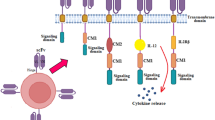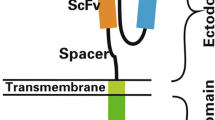Abstract
Background
Alloreactive T-cell responses are known to result in the production of large amounts of proinflammatory cytokines capable of activating and maturing dendritic cells (DC). However, it is unclear whether these allogeneic responses could also act as an adjuvant for concurrent antigen-specific responses.
Objective
To examine effects of simultaneous alloreactive and antigen-specific T-cell responses induced by semi-allogeneic DC.
Methods
Semi-allogeneic DC were generated from the F1 progeny of inbred strains of mice (C57BL/6 and C3H, or C57BL/6 and DBA). We directly primed antigen-specific CD8+ and CD4+ T-cells from OT-I and OT-II mice, respectively, in the absence of allogeneic responses, in vitro, and in the presence or absence of alloreactivity in vivo.
Results
In vitro, semi-allogeneic DC cross-presented ovalbumin (OVA) to naïve CD8+ OT-I transgenic T-cells, primed naïve CD4+ OT-II transgenic T-cells and could stimulate strong alloreactive T-cell proliferation in a primary mixed lymphocyte reaction (MLR). In vivo, semi-allogeneic DC migrated efficiently to regional lymph nodes but did not survive there as long as autologous DC. In addition, they were not able to induce cytotoxic T-lymphocyte (CTL) activity to a target peptide, and only weakly stimulated adoptively transferred OT-II cells. The CD4+ response was unchanged in allo-tolerized mice, indicating that alloreactive T-cell responses could not provide help for concurrently activated antigen-specific responses. In an EL4 tumour-treatment model, vaccination with semi-allogeneic DC/EL4 fusion hybrids, but not allogeneic DC/EL4 hybrids, significantly increased mouse survival.
Conclusion
Expression of self-Major histocompatibility complex (MHC) by semi-allogeneic DC can cause the induction of antigen-specific immunity, however, concurrently activated allogeneic bystander responses do not provide helper or adjuvant effects.







Similar content being viewed by others
Abbreviations
- 51Cr:
-
51Chromium
- CFSE:
-
Carboxy fluorescein succinimidyl ester
- CTL:
-
Cytotoxic T-lymphocyte
- DC:
-
Dendritic cell
- ES:
-
Embryonic stem cells
- MHC:
-
Major histocompatibility complex
- MLR:
-
Mixed lymphocyte reaction
- OVA:
-
Ovalbumin
- SEM:
-
Standard error of the mean
- TCR:
-
T-cell receptor
References
Avigan D, Vasir B, Gong J, Borges V, Wu Z, Uhl L, Atkins M, Mier J, McDermott D, Smith T, Giallambardo N, Stone C, Schadt K, Dolgoff J, Tetreault JC, Villarroel M, Kufe D (2004) Fusion cell vaccination of patients with metastatic breast and renal cancer induces immunological and clinical responses. Clin Cancer Res 10:4699–4708
Banchereau J, Palucka AK, Dhodapkar M, Burkeholder S, Taquet N, Rolland A, Taquet S, Coquery S, Wittkowski KM, Bhardwaj N, Pineiro L, Steinman R, Fay J (2001) Immune and clinical responses in patients with metastatic melanoma to CD34+ progenitor-derived dendritic cell vaccine. Cancer Res 61:6451–6458
Banchereau J, Schuler-Thurner B, Palucka AK, Schuler G (2001) Dendritic cells as vectors for therapy. Cell 106:271–274
Barber LD, Madrigal JA (2006) Exploiting beneficial alloreactive T cells. Vox Sang 91:20–27
Beriou G, Peche H, Guillonneau C, Merieau E, Cuturi MC (2005) Donor-specific allograft tolerance by administration of recipient-derived immature dendritic cells and suboptimal immunosuppression. Transplantation 79:969–972
Barnden MJ, Allison J, Heath WR, Carbone FR (1998) Defective TCR expression in transgenic mice constructed using cDNA-based alpha- and beta-chain genes under the control of heterologous regulatory elements. Immunol Cell Biol 76:34–40
Bingaman AW, Ha J, Durham MM, Waitze SY, Tucker-Burden C, Cowan SR, Pearson TC, Larsen CP (2001) Analysis of the CD40 and CD28 pathways on alloimmune responses by CD4+ T cells in vivo. Transplantation 72:1286–1292
Bregni M, Ueno NT, Childs R (2006) The second international meeting on allogeneic transplantation in solid tumors. Bone Marrow Transplant 38:527–537
Buhlmann JE, Gonzalez M, Ginther B, Panoskaltsis-Mortari A, Blazar BR, Greiner DL, Rossini AA, Flavell R, Noelle RJ (1999) Cutting edge: sustained expansion of CD8+ T cells requires CD154 expression by Th cells in acute graft versus host disease. J Immunol 162:4373–4376
Childs R, Chernoff A, Contentin N, Bahceci E, Schrump D, Leitman S, Read EJ, Tisdale J, Dunbar C, Linehan WM, Young NS, Barrett AJ (2000) Regression of metastatic renal-cell carcinoma after nonmyeloablative allogeneic peripheral-blood stem-cell transplantation. N Engl J Med 343:750–758
Conrad R, Remberger M, Cederlund K, Hentschke P, Sundberg B, Ringden O, Barkholt L (2006) Inflammatory cytokines predominate in cases of tumor regression after hematopoietic stem cell transplantation for solid cancer. Biol Blood Marrow Transplant 12:346–354
Dhodapkar MV, Steinman RM (2002) Antigen-bearing immature dendritic cells induce peptide-specific CD8+ regulatory T cells in vivo in humans. Blood 100:174–177
Dhodapkar MV, Steinman RM, Krasovsky J, Munz C, Bhardwaj N (2001) Antigen-specific inhibition of effector T cell function in humans after injection of immature dendritic cells. J Exp Med 193:233–238
Dubsky P, Ueno H, Piqueras B, Connolly J, Banchereau J, Palucka AK (2005) Human dendritic cell subsets for vaccination. J Clin Immunol 25:551–572
Fabre JW (2001) The allogeneic response and tumor immunity. Nat Med 7:649–652
Ferrara JL (1993) Cytokine dysregulation as a mechanism of graft versus host disease. Curr Opin Immunol 5:794–799
Fukuma D, Matsuyoshi H, Hirata S, Kurisaki A, Motomura Y, Yoshitake Y, Shinohara M, Nishimura Y, Senju S (2005) Cancer prevention with semi-allogeneic ES cell-derived dendritic cells. Biochem Biophys Res Commun 335:5–13
Galea-Lauri J (2002) Immunological weapons against acute myeloid leukaemia. Immunology 107:20–27
Galea-Lauri J, Darling D, Mufti G, Harrison P, Farzaneh F (2002) Eliciting cytotoxic T lymphocytes against acute myeloid leukemia-derived antigens: evaluation of dendritic cell-leukemia cell hybrids and other antigen-loading strategies for dendritic cell-based vaccination. Cancer Immunol Immunother 51:299–310
Galea-Lauri J, Wells JW, Darling D, Harrison P, Farzaneh F (2004) Strategies for antigen choice and priming of dendritic cells influence the polarization and efficacy of antitumor T-cell responses in dendritic cell-based cancer vaccination. Cancer Immunol Immunother 53:963–977
Gong J, Nikrui N, Chen D, Koido S, Wu Z, Tanaka Y, Cannistra S, Avigan D, Kufe D (2000) Fusions of human ovarian carcinoma cells with autologous or allogeneic dendritic cells induce antitumor immunity. J Immunol 165:1705–1711
Hogquist KA, Jameson SC, Heath WR, Howard JL, Bevan MJ, Carbone FR (1994) T cell receptor antagonist peptides induce positive selection. Cell 76:17–27
Jiang HR, Muckersie E, Robertson M, Forrester JV (2003) Antigen-specific inhibition of experimental autoimmune uveoretinitis by bone marrow-derived immature dendritic cells. Invest Ophthalmol Vis Sci 44:1598–1607
Karttunen J, Sanderson S, Shastri N (1992) Detection of rare antigen-presenting cells by the lacZ T-cell activation assay suggests an expression cloning strategy for T-cell antigens. Proc Natl Acad Sci USA 89:6020–6024
Kusmartsev S, Cheng F, Yu B, Nefedova Y, Sotomayor E, Lush R, Gabrilovich D (2003) All-trans-retinoic acid eliminates immature myeloid cells from tumor-bearing mice and improves the effect of vaccination. Cancer Res 63:4441–4449
Lappin MB, Weiss JM, Delattre V, Mai B, Dittmar H, Maier C, Manke K, Grabbe S, Martin S, Simon JC (1999) Analysis of mouse dendritic cell migration in vivo upon subcutaneous and intravenous injection. Immunology 98:181–188
Laurin D, Kanitakis J, Bienvenu J, Bardin C, Bernaud J, Lebecque S, Gebuhrer L, Rigal D, Eljaafari A (2004) Allogeneic reaction induces dendritic cell maturation through proinflammatory cytokine secretion. Transplantation 77:267–275
Lee WC, Zhong C, Qian S, Wan Y, Gauldie J, Mi Z, Robbins PD, Thomson AW, Lu L (1998) Phenotype, function, and in vivo migration and survival of allogeneic dendritic cell progenitors genetically engineered to express TGF-beta. Transplantation 66:1810–1817
Lutz MB, Suri RM, Niimi M, Ogilvie AL, Kukutsch NA, Rossner S, Schuler G, Austyn JM (2000) Immature dendritic cells generated with low doses of GM-CSF in the absence of IL-4 are maturation resistant and prolong allograft survival in vivo. Eur J Immunol 30:1813–1822
Marten A, Renoth S, Heinicke T, Albers P, Pauli A, Mey U, Caspari R, Flieger D, Hanfland P, Von Ruecker A, Eis-Hubinger AM, Muller S, Schwaner I, Lohmann U, Heylmann G, Sauerbruch T, Schmidt-Wolf IG (2003) Allogeneic dendritic cells fused with tumor cells: preclinical results and outcome of a clinical phase I/II trial in patients with metastatic renal cell carcinoma. Hum Gene Ther 14:483–494
McIlroy D, Gregoire M (2003) Optimizing dendritic cell-based anticancer immunotherapy: maturation state does have clinical impact. Cancer Immunol Immunother 52:583–591
Moore MW, Carbone FR, Bevan MJ (1988) Introduction of soluble protein into the class I pathway of antigen processing and presentation. Cell 54:777–785
Nair S, McLaughlin C, Weizer A, Su Z, Boczkowski D, Dannull J, Vieweg J, Gilboa E (2003) Injection of immature dendritic cells into adjuvant-treated skin obviates the need for ex vivo maturation. J Immunol 171:6275–6282
Noble A, Leggat JA, Inderberg EM (2003) CD8+ immunoregulatory cells in the graft-versus-host reaction: CD8 T cells activate dendritic cells to secrete interleukin-12/interleukin-18 and induce T helper 1 autoantibody. Immunology 109:476–486
Peng Q, Li K, Patel H, Sacks SH, Zhou W (2006) Dendritic cell synthesis of C3 is required for full T cell activation and development of a Th1 phenotype. J Immunol 176:3330–3341
Siders WM, Vergilis KL, Johnson C, Shields J, Kaplan JM (2003) Induction of specific antitumor immunity in the mouse with the electrofusion product of tumor cells and dendritic cells. Mol Ther 7:498–505
Suchin EJ, Langmuir PB, Palmer E, Sayegh MH, Wells AD, Turka LA (2001) Quantifying the frequency of alloreactive T cells in vivo: new answers to an old question. J Immunol 166:973–981
Suzuki T, Fukuhara T, Tanaka M, Nakamura A, Akiyama K, Sakakibara T, Koinuma D, Kikuchi T, Tazawa R, Maemondo M, Hagiwara K, Saijo Y, Nukiwa T (2005) Vaccination of dendritic cells loaded with interleukin-12-secreting cancer cells augments in vivo antitumor immunity: characteristics of syngeneic and allogeneic antigen-presenting cell cancer hybrid cells. Clin Cancer Res 11:58–66
Wallgren AC, Andersson B, Backer A, Karlsson-Parra A (2005) Direct allorecognition promotes activation of bystander dendritic cells and licenses them for Th1 priming: a functional link between direct and indirect allosensitization. Scand J Immunol 62:234–242
Wells JW, Darling D, Farzaneh F, Galea-Lauri J (2005) Influence of interleukin-4 on the phenotype and function of bone marrow-derived murine dendritic cells generated under serum-free conditions. Scand J Immunol 61:251–259
Whitelegg AM, Oosten LE, Jordan S, Kester M, van Halteren AG, Madrigal JA, Goulmy E, Barber LD (2005) Investigation of peptide involvement in T cell allorecognition using recombinant HLA class I multimers. J Immunol 175:1706–1714
Wierecky J, Mueller M, Brossart P (2006) Dendritic cell-based cancer immunotherapy targeting MUC-1. Cancer Immunol Immunother 55:63–67
Willis RA, Kappler JW, Marrack PC (2006) CD8 T cell competition for dendritic cells in vivo is an early event in activation. Proc Natl Acad Sci USA 103:12063–12068
Yu G, Xu X, Vu MD, Kilpatrick ED, Li XC (2006) NK cells promote transplant tolerance by killing donor antigen-presenting cells. J Exp Med 203:1851–1858
Acknowledgements
This work was supported by Leukaemia Research Fund and a JRC studentship from King’s College London School of Medicine.
Author information
Authors and Affiliations
Corresponding author
Additional information
Joanna Galea-Lauri and Alistair Noble share senior authorship of this work.
Rights and permissions
About this article
Cite this article
Wells, J.W., Cowled, C.J., Darling, D. et al. Semi-allogeneic dendritic cells can induce antigen-specific T-cell activation, which is not enhanced by concurrent alloreactivity. Cancer Immunol Immunother 56, 1861–1873 (2007). https://doi.org/10.1007/s00262-007-0328-x
Received:
Accepted:
Published:
Issue Date:
DOI: https://doi.org/10.1007/s00262-007-0328-x




